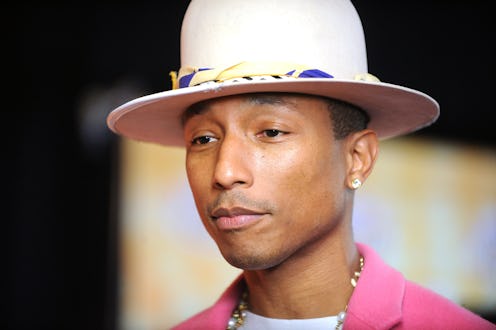Entertainment
Pharrell Responds to Critics of 'GIRL' Cover
Non-vampire Pharrell Williams finally revealed what he was hiding under that Elmer Fudd hat: his new album, G I R L, which is streaming now on iTunes and will be available for purchase on March 3. G I R L is no dissappointment—of course, since it's from Pharrell, it's laden with great beats and is apparently a decidedly feminist ode to the women he loves (who are those lucky ladies? how do I become one?) with lyrics like "This one goes out to all the lovers / What can we do? We’re helpless romantics / We can not help who we’re attracted to / So let’s all dance, and elevate each other." If Pharrell needs any volunteers to elevate him, my hands and feet are raised.
But when he revealed the album cover for G I R L, a photo of Pharrell surrounded by three beautiful women, some bristled at the apparent lack of a black woman among the female eye candy. Attention was called to the participation of colorism by black men themselves; colorism being the hierarchy in communities of color, in this case the black community, which favors lightness over darkness as a more attractive and acceptable form of color (as it mimics whiteness). One particular critic of G I R L was Ebony magazine's digital content editor Jamilah Lemieux, who penned this article, in which she notes:
I think that anyone with a cursory knowledge of European standards of beauty and colorism could, on some level, understand why a record by a Black man posing with three seemingly not-Black/possible maybe-one-chick-might-could-be-mixed women entitled “GIRL” could be construed as offensive or disappointing. The fact that one brown man chooses (Pharrell is not some Z-list cat who just gets stuck with whatever women the label tells him to use, mmkay?) to be surrounded by three extremely pale women for this one album cover—you don’t release a record every day, so it’s not like we can say “The last 3 had Black women!”—is corny. And if you don’t think it speaks to White/light is right, you don’t get it or just don’t care.
Pharrell responded yesterday, though, to the backlash; he spoke to Charlemagne on NYC's 105.1 Breakfast Club and had this to say about the cries of colorism:
What really disappointed me is they jumped the gun, because the one I’m standing closest to is black. She’s a black girl from Wisconsin that I used to date over ten years ago or maybe like twelve years ago. That just must suck man for people to look at something and to assume they know what’s going on. If they just bothered to listen to my album, they would know that my album was an ode to women, period. And the one thing that I’m trying to kill…well I can’t kill anything…but the one thing I was just trying to help and aid in changing the crazy statuesque standard of you gotta be white, waif, and thin for you to be beautiful.
It is important to note that Pharrell DOES point out that one of the women is black, and that it is not fair to strip her of her blackness because she is not dark-skinned (he later said in the interview, "it must suck to be that black woman that’s on my cover right now because she’s black. When they find out that she is black, then what?") But he could have more actively engaged the valid points that Lemieux made, that colorism is still potent; Pharrell's response was more touch-and-go, acknowledging but not really that there is a black woman on the color, but then immediately turning the conversation to the content of his album. It's a subtle form of silencing on Pharrell's part to not even give credit to the very real existence of colorism that is present.
Does that mean Pharrell had a duty to include a darker woman on his album cover? No, but to glibly pass over his critics' concerns is also unacceptable. When Charlemagne later joked that Pharrell should include a dark-skinned black woman like Gabourey Sidibe in his new video, he responded:
I refuse. My whole album is about women — period. There’s such a bigger statement that I’m making in the album that relates to all women and that’s how I think we bring everyone together is when we respect the female species across the board.
The thing is, it's not about "appeasing" critics or "folding to demands." It's about acknowledging that there is no "female species across the board" as Pharrell envisions.
I don't think Pharrell had the intention to erase such important conversations, but intention is secondary to consequence. He could have spoken to Lemieux's point that black men on Twitter were quick to use his response as a "quit complaining" to women who called colorism. He caused some very real hurt, whether he meant to or not. It's encouraging that difficult conversations about the hierarchy of beauty ideals in communities of color are happening in the mainstream, but I think Pharrell needs to reel in his unfettered optimism. We are not unifying as quickly as he believes.
